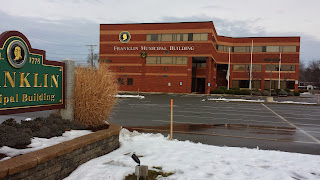Continuing the trip through the Franklin Annual Report for 2013, we come to the section on the Charles River Pollution Control District. If you ever wondered why Franklin doesn't have a waste water treatment plant within town like other communities do, this is the reason. Franklin sends its waste water to the plant location in Medway for treatment.
During Fiscal Year 2013, the Charles River Pollution Control District’s (District) regional advanced wastewater treatment facility received and treated approximately 1,600 million gallons (4.4 million gallons per day) of raw wastewater, including 6.5 million gallons of septage from the District’s member and customer towns before discharge to the Charles River. The volume of waste treated was lower than the previous year due to a decrease in precipitation.
The District is anticipating the renewal process to begin for its National Pollution Discharge Elimination System (NPDES) permit for discharge of its treated wastewater to the Charles River. Under the preliminary draft NPDES permit, the District and the Towns of Franklin, Medway, Millis, and Bellingham will have to maintain an ongoing preventive maintenance program to prevent overflows and bypasses caused by malfunctions or failures of the sewer system and an infiltration and inflow reduction program. In addition, the new limit for phosphorus is being reduced from 0.2 mg/L to 0.1 mg/L in the summer months and a winter limit of 1.0 mg/L is being added.
CDM Smith and staff from the District prepared a 20-year capital improvement plan (CIP) to improve the wastewater treatment facility to meet more stringent NPDES permitting requirements and provide a more reliable wastewater treatment facility at its current capacity.
In July 2010, the District was informed of its acceptance on the Massachusetts Department of Environmental Protection (Mass DEP) Bureau of Resource Protection Calendar Year 2010 Intended Use List for State Revolving Funding (SRF). In order to expedite the designs and proceed with the project in a timely manner, the CIP was divided into three phases (A, B and C).
- Phase A, which has reached substantial completion, includes the replacement of both primary clarifier mechanisms, addition of two screenings washer/compactors in the wet well, primary scum handling improvements, and plant lighting and security improvements.
- Phase B, the capping of the on-site residuals landfill, is also substantially complete.
- Phase C, focuses on reducing phosphorus, improving the disinfection system, and extending the life of the facility for an additional 20 years. This phase is currently being designed with bidding scheduled for this fall. Construction is expected to begin in early 2014. A District-wide Global Information System was developed as part of this phase to assist with infiltration and inflow reduction requirements.
The District funded Phases A and B with a 20-year State Revolving Fund (SRF) loan of approximately $3.5M for costs associated with bidding, construction, and resident engineering. Planning and design costs for these phases were paid from the District’s capital budget. Planning and design costs for Phase C, which are not eligible for SRF loans, will be funded by a General Obligation Bond of approximately $1.95M. The total project cost is still under review and will become more detailed as design progresses.
The District is one of seven municipal wastewater treatment plants selected by the Mass DEP to participate in a pilot program that involves energy auditing, assessments for renewable and clean energy possibilities, and support of implementation for energy related projects. The purpose of this pilot program is to reduce the amount of energy used at municipal wastewater treatment plants by 20%, thereby reducing greenhouse gas emissions and saving municipalities money. The District was granted $847,583 through the American Recovery and Reinvestment Act to install a 20 kW solar voltaic array and two turbo style blowers. The solar panels will produce energy onsite whereas the turbo blowers will provide oxygen to the secondary treatment system using approximately 30% less power than the existing blowers. The District is anticipating a 20% reduction in energy costs from these energy improvements. At this time, the solar voltaic array is producing energy which is used at the treatment plant and the turbo blowers provide oxygen to the activated sludge process.
The District’s Fiscal Year 2014 budget is 8.3% lower than the previous years’ budget. The District’s FY 2014 budget for operations and maintenance is $3,033,690, while the capital projects budget is $643,150. Franklin’s share of the operation and maintenance and capital projects budgets are estimated to be $1,771,040 and $386,000, respectively.
Respectively submitted
Douglas M. Downing, Chairman (Medway)
William J. Goode, Jr., Vice-Chairman (Franklin)
Alfred H. Wahlers, Clerk, (Franklin)
Paul J. DeSimone (Medway)
Gene Guidi, (Franklin)
CRPCD Officers:
Cheri R. Cousens, P.E., Executive Director
Emma J. Catalano, Treasurer
Barbara Maffeo, Executive Secretary
Cornetta, Ficco, Simmler, and Vallee, Legal Counsel
 |
| Franklin Municipal Building |
The full annual report can be obtained from the Town Clerk's office (hard copy) or viewed and/or downloaded from the Franklin website here
http://town.franklin.ma.us/Pages/FranklinMA_Clerk/annual/2013report.pdf
Annual reports of prior years can also be found online at
http://town.franklin.ma.us/Pages/FranklinMA_Clerk/annual/















